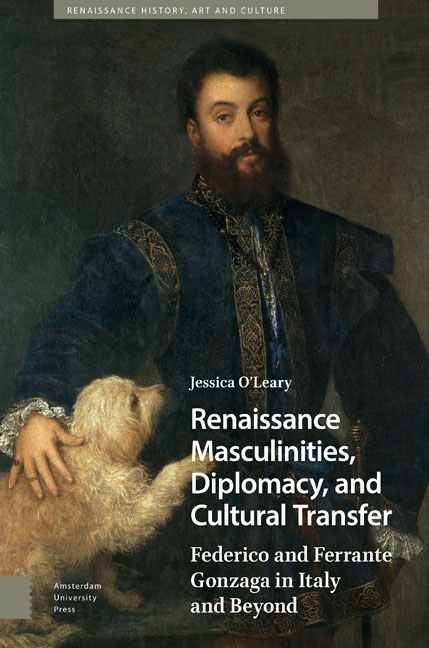 Renaissance Masculinities, Diplomacy, and Cultural Transfer
Renaissance Masculinities, Diplomacy, and Cultural Transfer Book contents
- Frontmatter
- Contents
- Acknowledgements
- Abbreviations
- Maps and Figures
- Introduction
- 1 Crisis Diplomacies in the Italian Wars
- 2 Warring Masculinities
- 3 Imperial Masculinities
- 4 Diplomacy of Magnificence
- 5 Imperial Networks and Loyalties
- 6 Interpretations of Renaissance Masculinities
- Conclusion
- Bibliography
- Index
1 - Crisis Diplomacies in the Italian Wars
Published online by Cambridge University Press: 08 May 2024
- Frontmatter
- Contents
- Acknowledgements
- Abbreviations
- Maps and Figures
- Introduction
- 1 Crisis Diplomacies in the Italian Wars
- 2 Warring Masculinities
- 3 Imperial Masculinities
- 4 Diplomacy of Magnificence
- 5 Imperial Networks and Loyalties
- 6 Interpretations of Renaissance Masculinities
- Conclusion
- Bibliography
- Index
Summary
Abstract
The first chapter examines the Gonzaga family's survival during the Italian Wars. The Gonzaga deftly navigated the Wars through strategic alliances, dynastic networks and cultural influence marked by generational shifts. Initially, they relied on effective intra-Italian diplomacy through the Italian League. However, subsequent generations adapted, forging deeper bonds with France and Spain, while recognising the ascent of Ottoman naval supremacy. This shift in strategy created tension between generations, symbolic of Italy's contested transition from independence to foreign influence. As a result, this chapter contextualises the fortunes of the Gonzaga family within the Italian Wars and how their strategies evolved over time.
Keywords: Gonzaga, Habsburg-Valois Wars, Cultural Exchange, Masculinities, Francis I, Charles V
In late December 1494, a Ferrarese chronicler reported that Charles VIII, King of France, had entered Rome. Pope Alexander VI had allowed the monarch to enter on the condition of peace after Charles's forces had ravaged several northern Italian towns. Beginning in September, Rapallo, Mordano, and Fivizzano were sacked by a thirty-thousand strong army of French cavalry and Swiss mercenaries, whose ruthless pike tactics caused a state of panic across the Italian peninsula. By November, Piero de’ Medici, lord of the once mighty Republic of Florence, yielded to Charles's demands for safe passage, provoking outrage among its proud subjects. Yet, no Italian state could halt the French: Charles's soldiers had rations for six months, while the papal and Neapolitan armies had none. These rations came at the expense of the Romans who complained to the pope that Charles VIII had so restricted Rome, no living person could enter. Yet, Alexander VI paid little heed, fearful of the army's savagery. By February 1495, the French had conquered Naples.
Italy was in shock. For almost half a century, Italians had enjoyed peace and prosperity following the Peace of Lodi and the formation of the Italian League in 1454. The League was an alliance between several Italian states, notably Milan, Florence, and Naples, that acted as a deterrent to the Venetians, who remained independent. Beginning in the 1480s, the balance of power was strengthened as a result of the collective diplomacy of Lorenzo de’ Medici of Florence, Ludovico Sforza of Milan, and King Ferrante d’Aragona of Naples.
- Type
- Chapter
- Information
- Renaissance Masculinities, Diplomacy, and Cultural TransferFederico and Ferrante Gonzaga in Italy and Beyond, pp. 33 - 64Publisher: Amsterdam University PressPrint publication year: 2024
